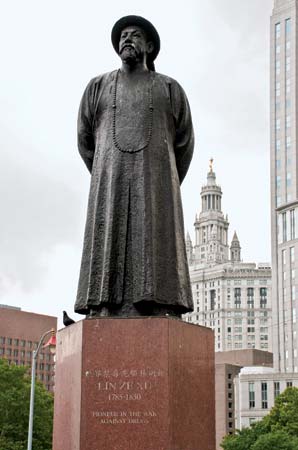 |
| Lin Zexu (Lin Tse-hsu) |
He served with distinction and gained the popular accolade “Lin, Clear as the Heavens” for being just and incorruptible. He became governor-general of Hunan and Hubei (Hupei) Provinces in 1837, where he had notable success in implementing anti-opium laws and also took steps to cure addicts of their habits.
Opium had been imported to China since the late seventh century as a medicine. It became a recreational drug after the 17th century, and as addiction spread, the government became concerned.
The law that banned opium smoking was issued in 1729; another law in 1796 totally banned its importation and cultivation, but neither had any effect, and increasing amounts were smuggled into China, mostly by British traders.
By the early 19th century, the opium problem had caused an economic, public health, and moral crisis for China, but its cultivation and sale under the British in Bengal (India) had become a lucrative source of revenue for the British treasury.
In 1838 Emperor Daoguang (Tao-kuang) ordered a full-scale debate on methods to deal with the opium problem. One school favored legalization, taxing, and controlling its access. Another group advocated strict prohibition; Lin was among them, and because of his exemplary record, he was summoned to Beijing (Peking) for consultation.
He was then appointed Imperial Commissioner, with plenipotentiary powers to proceed to Canton to stamp out the evil. Arriving in Canton in early 1839, where 30,000 chests of the drug were imported annually and where opium shops were as numerous as gin shops in contemporary London, Lin first dealt with the Chinese.
He arrested corrupt officials who had not enforced the laws; confiscated smoking paraphernalia; closed opium shops; and made students, teachers, merchants, and civic leaders sign bonds to obey the law.
Next, Lin ordered foreign merchants to hand over their stocks of opium and sign bonds not to trade in it in the future. Those who did would be allowed to trade in legitimate merchandise, while those who refused had their places of trade embargoed.
He wrote a letter to Queen Victoria of Great Britain exhorting her to rein in evil merchants from her country whose greed inflicted such harm on the Chinese.
Realizing his implacable resolve, British Superintendent of Trade Charles Elliot handed over 20,283 chests of opium (however, he refused to sign a bond for future non-importation), which Lin publicly destroyed. Trade with Britain resumed in May 1839. Lin was at the peak of his power. But diplomatic, legal, and commercial problems between China and Britain remained unresolved.
 |
| Lin Zexu statue |
Lin then ordered stoppage of trade with Britain. British victories led to Lin’s dismissal. He was sent to Ili in Xinjiang (Sinkiang) in northwestern China, where he served with distinction, opening up over 500,000 acres of land for cultivation between 1842 and 1845.
He later served as governor-general of Shaanxi (Shensi) and Gansu (Kansu) Provinces in 1846 and of Yunnan and Guizhou (Kweichow) Provinces from 1847 to 1848. Lin was among the first Chinese officials to become interested in Western sciences, weaponry, and maritime defenses and began programs to translate Western books into Chinese.